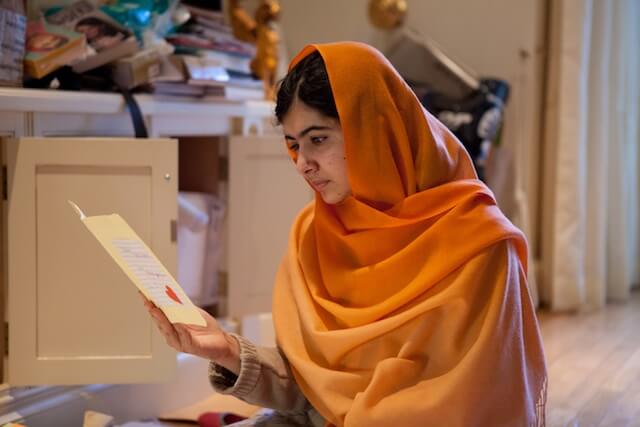‘He Named Me Malala’ The doc “He Named Me Malala” has an unusual dilemma: Its story is far from over, and the most dramatic part of it happened only three years ago. It’s a tale told mid-stride, namely of teen Pakistani activist Malala Yousafzai, who in 2012, at 15, was the subject of an attempted assassination. After speaking out against Taliban rule, she was shot while on a school bus; a bullet left the left side of her face partially paralyzed. She survived, was successfully rehabilitated and her and her family relocated to England, where she proceeded to become even more outspoken, this time as an almost-martyr. Last year she became the youngest person to win the Nobel Peace Prize, which she shared with Indian civil rights activist Kailash Satyarthi. That’s it for her story, and stirring as it is, a film about her is premature. But “He Named Me Malala” is not purely about her story. It’s not an expository Wikipedia movie. It’s also not a fly-on-the-wall doc that simply hangs with Malala and her family, including her dad, Ziauddin, who helped foment her political awakening. Nor is it an activist film, meant to whip up frenzy over an important issue. It’s none of these things and yet all of them, borrowing bits from each and mix and matching them into a doc with a severe crisis of identity — a film looking for a reason to exist as a feature-length documentary and not as a “60 Minutes” segment. It tries everything and still winds up feeling small and slight. RELATED: “Freeheld” is a crude gay rights drama with a great Julianne Moore Its main raison d’etre, though, is its intimate access to Malala herself, who tends to be known for her fiery public persona, passionately speaking truth to power. Director Davis Guggenheim tries to do to Malala what he did with Al Gore in “An Inconvenient Truth”: humanize her, in this case by actually treating her like a young girl. He asks her if she’s nervous asking out boys, prompting nervous titters. He asks her about her favorite books, but his camera passes by Nelson Mandela’s memoir to highlight her own book, “I Am Malala,” resting on the shelf. He spies as she teaches her dad how to use Twitter and peers in on her Google image searching Brad Pitt and Roger Federer. At one point she watches the Minions muck about in one of the “Despicable Me” movies. This is meant to paint Malala as a normal girl who just happens to speak out against oppression and discuss drones with Obama. It’s a necessary move, but it’s not an entire movie, and the remainder isn’t so much padding-out as endless trying on of new clothes, then abruptly ditching them for another outfit. It opens with animation depicting Malala’s namesake: Afghan freedom fighter and martyr Malala of Maiwand, an idol of her father’s. What remains could have been arranged on shuffle: now it’s spending time with Malala; now it’s following her on the road; now it’s showing some of her past, but not too much. It saves going into detail about the shooting itself for the end, which seems pointless since by then we’ve already pieced it together (or know it before entering the theater). Guggenheim is smart enough to avoid simple, reductionist this-happened-then-that-happened documentary filmmaking, but some of his docs can also feel disorganized, structure-less, borderline ADD. “Malala” is closer to “It Might Get Loud,” his exploration of guitarists Jimmy Page, The Edge and Jack White, which got so lost in not being simplistic that it felt diffuse and oblivious to what might be its reason for being (in its case: watching Jimmy Page, The Edge and Jack White jam). “Malala” has the same problem. It tries to reinvent the wheel and leaves a mess.
Director: Davis Guggenheim
Genre: Documentary
Rating: PG-13
2 (out of 5) Globes
‘He Named Me Malala’ is a scattershot, premature look at a hero

Fox Searchlight
Follow Matt Prigge on Twitter @mattprigge


















